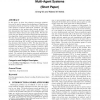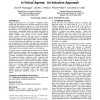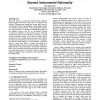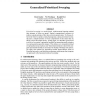615 search results - page 105 / 123 » A social reinforcement learning agent |
ATAL
2008
Springer
14 years 28 days ago
2008
Springer
The application of reinforcement learning algorithms to Partially Observable Stochastic Games (POSG) is challenging since each agent does not have access to the whole state inform...
ATAL
2008
Springer
14 years 28 days ago
2008
Springer
In this paper, we show how adaptive prototype optimization can be used to improve the performance of function approximation based on Kanerva Coding when solving largescale instanc...
ATAL
2008
Springer
14 years 28 days ago
2008
Springer
Humans continuously assess one another's situational context, modify their own affective state, and then respond based on these outcomes through empathetic expression. Virtua...
GECCO
2008
Springer
13 years 12 months ago
2008
Springer
This study proposes an agent-based model where adaptively learning agents with local vision who are situated in the Prisoner’s Dilemma game change their strategy and location as...
NIPS
1997
14 years 7 days ago
1997
Prioritized sweeping is a model-based reinforcement learning method that attempts to focus an agent’s limited computational resources to achieve a good estimate of the value of ...




